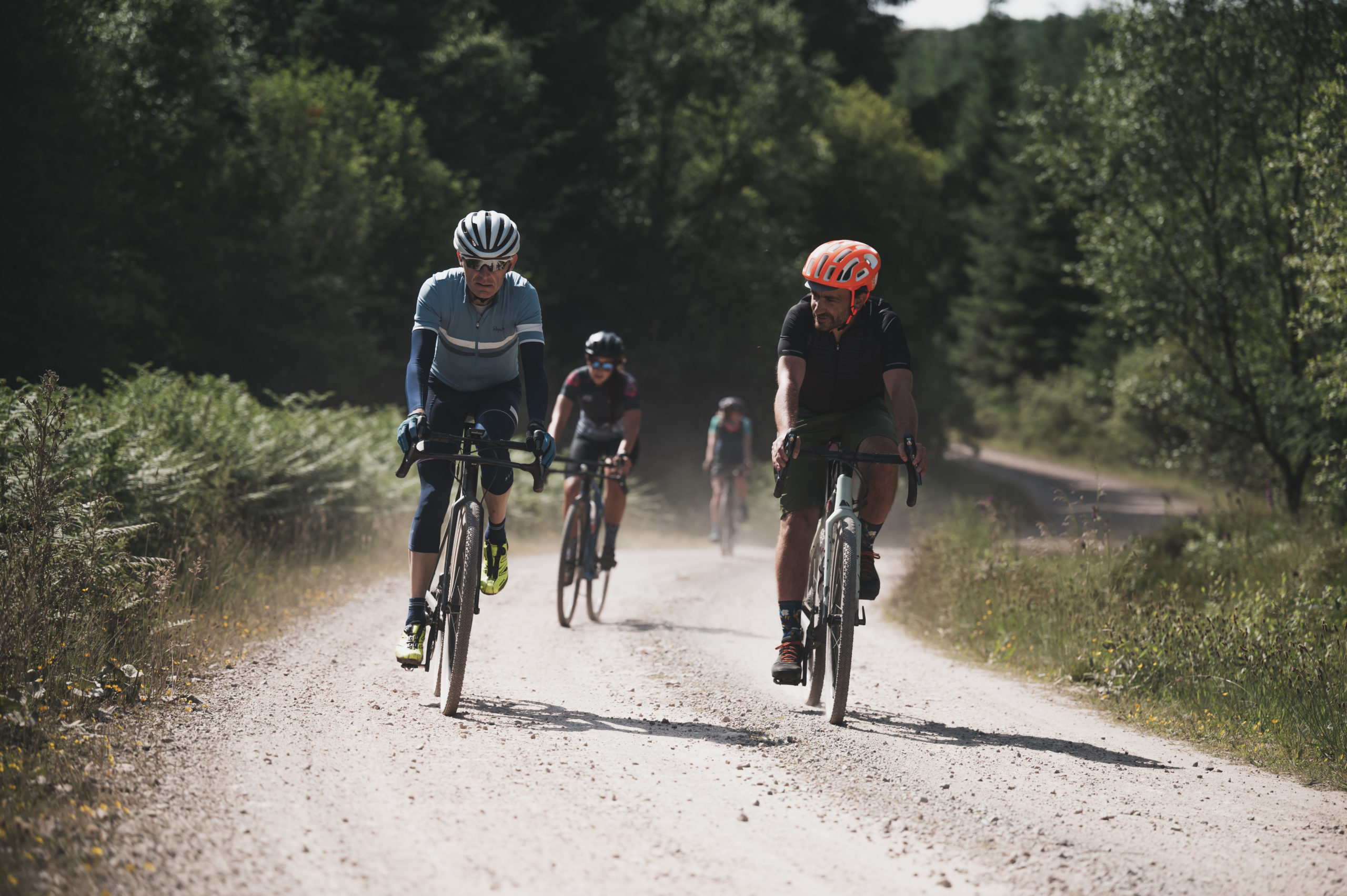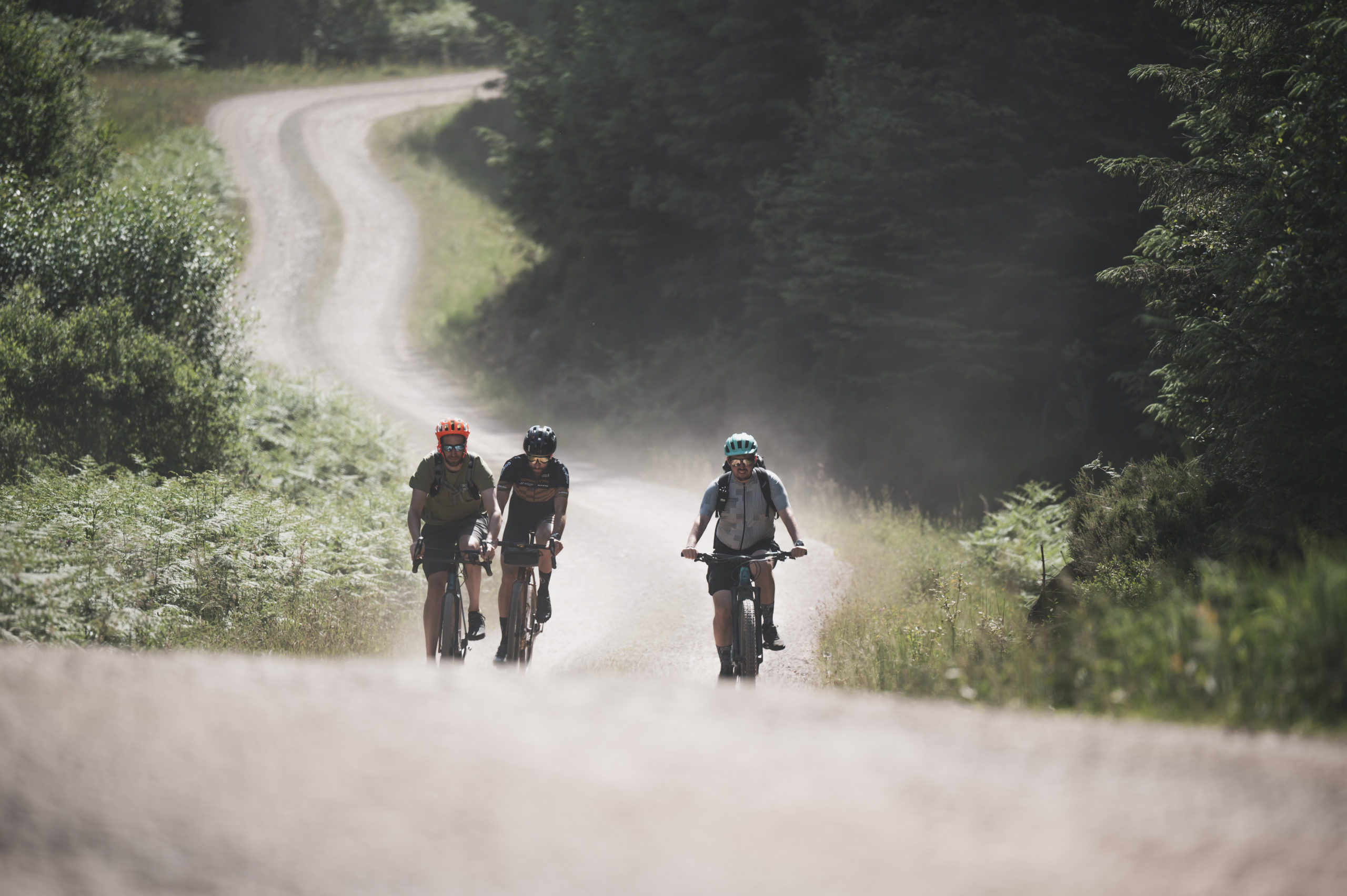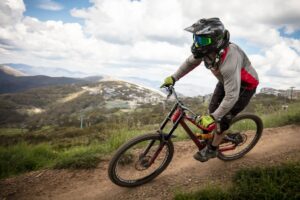Gravel Raiders, Bards and the Birthplace of the Bicycle

The design of the bottle of Dark Arts Gin, the first one from Scotland’s most southerly distillery, reflected well on what makes the southwest of Scotland much more than just a place to pass through. After the Highlands and Argyll, Bute Dumfries and Galloway is the 3rd largest council area in Scotland. But in contrast to the Highlands, it is possibly one of the lesser-known destinations. The beautifully designed bottle features tall trees, starlit skies and a touch of blue that reminds me of the smell of the sea.
For most visitors, Scotland starts here. In former times people’s journeys that crossed the border into Gretna Green, the first village in Scotland, might have mostly been inspired by the Scottish law, which allowed for ‘irregular marriages’. Contrary to English or Welsh law, a declaration was made before two witnesses, and almost anybody had the authority to conduct the marriage ceremony. The blacksmiths in Gretna became known as ‘anvil priests’, culminating with Richard Rennison, who performed 5,147 ceremonies in his lifetime. The local blacksmith and his anvil became lasting symbols of Gretna Green weddings.
Photo: Rupert Fowler
Another name that is closely connected with this part of Scotland is the greatest Scots of all – Robert ‘Rabbie’ Burns. More popular than William Wallace (according to a 2009 survey by television station STV), Burns collected folk songs from across Scotland, often revising or adapting them. His poem “Auld Lang Syne” is often sung at Hogmanay, and “Scots Wha Hae” served for a long time as an unofficial national anthem of the country. Although Burns was born in nearby Ayrshire, he spent the last years of his short life in Dumfries and is buried here.
A few decades after Burn’s death it was another blacksmith from Keir, about 40 miles north of Gretna and 14 miles west of Dumfries, who is generally credited with inventing the pedal driven bicycle. Kirkpatrick Macmillan quickly mastered the art of riding his invention on the rough country roads, and was soon accustomed to making the journey from Keir to Dumfries in less than an hour. His next exploit was to ride the 68 miles into Glasgow in June 1842. The trip took him two days and he was fined five shillings for causing a slight injury to a small girl who ran across his path.
A lot of those rough roads and paths that Macmillan tested his invention on lead into the Galloway Forest Park these days. According to Wikipedia it is the largest forest in the UK, and was granted ‘Dark Sky Park’ status in November 2009, being the first area in the UK to be designated with that status. It is also part of the Galloway and Southern Ayrshire UNESCO Biosphere, another first in Scotland.
Dark skies require little or no light pollution from human settlements. Dumfries and Galloway presents itself exactly this way when I leave the train station in Lockerbie and make my way west to discover this part of Scotland to visit a press launch for Raiders Gravel.
The Lake District is only about an hour’s drive away from Gretna, but you’ll be hard pushed to find any of its business here. And while different, Galloway matches the natural beauty of one of England’s most sought after holiday destinations. The few places where houses light up the dark skies at night are rather scattered.
The only problem you might have at times is getting the pronunciation right. Like with Kirkcudbright (pronounced kir-coo-bree), which has for long been a centre for visual artists and is now known as the ‘Artists’ Town’. Painters, textile artists, embroiderers, ceramicists, photographers, etchers, printmakers, sculptors, encaustic artists, willow makers and more all work in or around the town, and it features lovely places to eat and wander along the mouth of the tidal river Dee.
On my first visit to Kirkcudbright I met up with Esther and Warren from Galloway Cycling Holidays, who took me on an 80 km loop around the area, which featured anything from wide forest roads and tracks to small singletrack roads, beaches, native and planted forests and beautiful lochs. With about 900m of climbing it was a gentler gravel ride for Scottish standards, with gradual climbs and long descents.
Initially, it was mountain biking that put Dumfries and Galloway on the UK cycling map. Five of the eight 7Stanes mountain bike centres are in close proximity to each other: Glentrool, Kirroughtree, Dalbeatttie, Mabie and the Forest of Ae offer world-class off-road riding for fat tires.
The combination of hundreds of kilometres of gravel roads and the Scottish Outdoor Access Code have now made it one of the top destinations in Scotland for gravel riding too. While there is stiff competition from other areas that compete for the title as the best gravel riding destination (like Gravelfoyle, Perthshire, Angus, East Lothian and the Scottish Borders), Dumfries and Galloway’s dark skies and the lack of other people on the trails to share the area with make it special for me.
 Photo: Rupert Fowler
Photo: Rupert Fowler
The inaugural edition of Raiders Gravel, held from 7 to 10 October this year in Gatehouse of Fleet, will provide a great opportunity to not only experience the great gravel riding in the area across three race stages, but also to sample the tasty local food, and of course the gin from Scotland’s southernmost distillery.
Its format is unlike other events I have visited. Only teams of two can enter, but if you can’t find anyone to race with you, Raiders Gravel has also introduced the ‘Lonely Riders Club’, where you can hopefully find your ‘match’, maybe not just for the race duration?
In the next two days, I am certainly everything but lonely. I get to sample some more gravel on one of Canyon’s new gravel bikes, the Grizl, which carries me and a bunch of other bike journalists on coastal roads and gravel tracks past the local sights. We stop at the Coo Palace, Scotland’s only dairy farm turned luxury holiday accommodation, and make our way to refuel at the Cream o’ Galloway ice cream parlour. After a comfy night with food and gin at Cally Palace Hotel, with a room big enough to do loops on the bike (joking), we tackle the Raider’s Road to end up at a great cafe overlooking the tranquil Clatteringshaws Loch, a haven for waterbirds in summer, on day two. More gravel, more smiles.
It’s hot and dusty. When I look at the pictures from the two days I am more reminded of the dusty flint hills in the east of Kansas. As I know Scotland well, the weather is the only thing that is too good to be true. Everything else, the great cycling, hospitality and fabulous landscape, is no doubt what I came here for, and I wasn’t disappointed.
More information about cycling in the South of Scotland can be found on scotlandstartshere.com.
More information about Raiders Gravel can be found at raidersgravel.com
While you’re here, why not get an instant online mountain bike insurance quote from Yellow Jersey?






